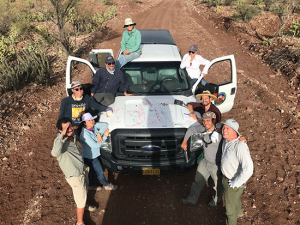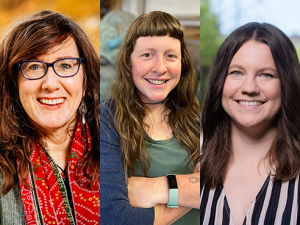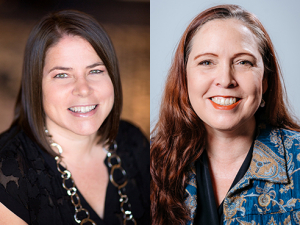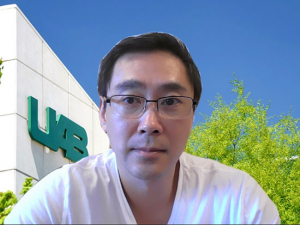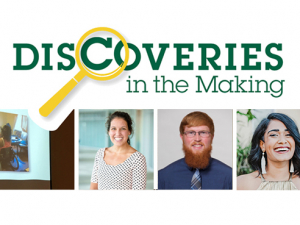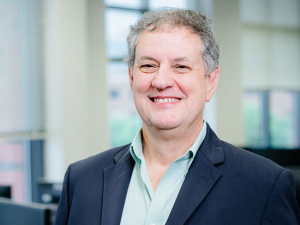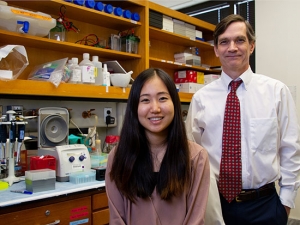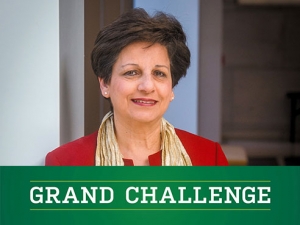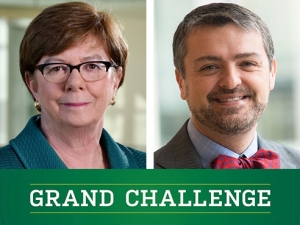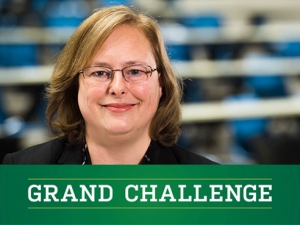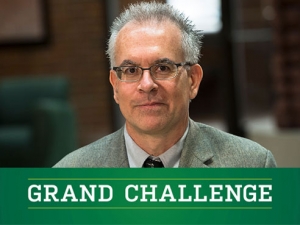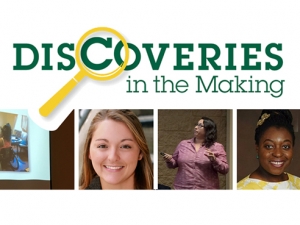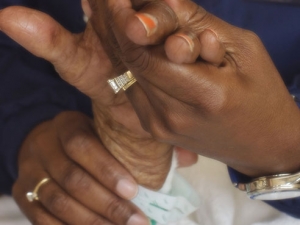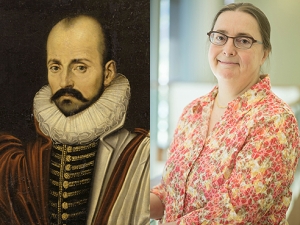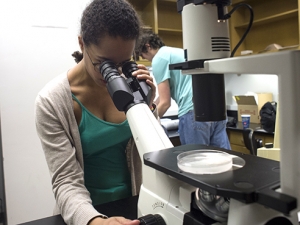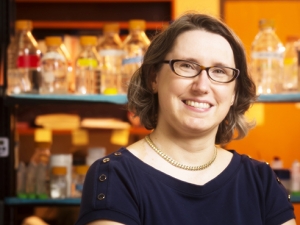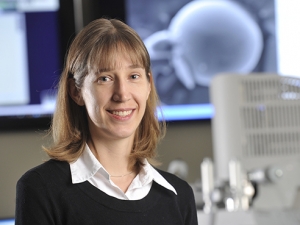A new partnership between the Genetics and Genomic Sciences (GGS) Graduate Program and research juggernaut HudsonAlpha Institute for Biotechnology in Huntsville will substantially increase UAB’s expertise and exposure in the area of genomics and give students the opportunity to engage in large-scale genomic analyses.
 |
| A recent partnership between the GGS Graduate Program and HudsonAlpha will give UAB students like Ben Weaver, standing, the opportunity to engage the highest-quality researchers and tools available in the field of genomics. |
Dan Bullard, Ph.D., director of the genetics and genomic sciences graduate program and professor in the department of genetics, says this partnership will significantly strengthen the graduate program and provide students an opportunity to perform research rotations and their dissertation work in one of HudsonAlpha’s high-tech investigator laboratories.
“HudsonAlpha is a world-class facility that is attracting high-quality investigators to Huntsville,” Bullard says. “The research they can accomplish is truly amazing. They are sequencing and analyzing genomes from humans, animals and other organisms and routinely use additional state-of-the-art genomic technologies that make many in the science community envious. And their scientists aren’t just doing these things because they can. They’re applying these approaches to better understand the genetic basis for complex biological problems including different diseases such as cancer.”
UAB Graduate School Dean Bryan Noe, Ph.D., says the partnership will give faculty and students access to some of the highest-quality researchers and tools available in the field of genomics.
“The opportunity for UAB graduate students to choose a dissertation advisor from among the world-class investigators at HudsonAlpha, many of whom are engaged in cutting-edge research different than that being performed by any UAB faculty, is truly unique,” Noe says. “We anticipate that being able to provide this option to prospective students will prove to be a potent recruitment tool.”
HudsonAlpha, a non-profit organization, is the cornerstone of a 150-acre biotech campus strategically located in Cummings Research Park, the nation’s second-largest research park. Researchers at HudsonAlpha are making discoveries and transforming new knowledge into solutions to make significant advancements in health, well-being and livelihood. UAB has more than 20 ongoing collaborations with HudsonAlpha, including in the areas of breast cancer, metabolomics and rheumatology.
Chris Gunter, Ph.D., HudsonAlpha director of research affairs, says its researchers view this graduate school collaboration as important because of UAB’s strong genetics program. She says combining the expertise of the programs will significantly strengthen both entities.
“Having a relationship with UAB is very important to us because they have a strong genetics program, particularly in clinical genetics,” Gunter says. “We can add to UAB’s molecular genetics offerings because we have some investigators working on projects not being done at UAB. We believe this will give students more options and help UAB compete against other graduate schools, something that is important to us.”
Incredible access
UAB graduate student Ben Weaver began working in Greg Cooper’s HudsonAlpha lab this summer.
Weaver, a Birmingham native and an alum of UAB’s undergraduate program, hopes to use bioinformatics and theories of molecular evolution to address questions in practical biology and possibly broaden our view of evolutionary theory at large. Weaver hopes to accomplish this in an academic setting, but says he believes HudsonAlpha is preparing him to work either in academia or the private sector.
“Having access to the incredible skill sets of my mentor, Dr. Cooper, and other HudsonAlpha investigators is a huge boost to my career,” Weaver says. “From a training perspective, the research performed here is top-notch, and it certainly helps to be working with and around investigators who are so well-recognized and well-published. Since HudsonAlpha houses a number of small biotech startups, there is also the potential for easily connecting with and transitioning into the private sector, an option that I am keeping open.”
Bullard says with the further development of rapid and inexpensive genomic technologies, including DNA sequencing, there will be an increase in the number of job opportunities at universities, medical centers, government labs and in the private sector. The opportunity for UAB students to receive training here and at HudsonAlpha will give them the best scientific training in genetics and genomic analyses.
Weaver says he hasn’t been sitting on the sidelines since arriving to train at HudsonAlpha. He’s been involved in research, and the sense of camaraderie and collaboration has been eye-opening.
“You are given the feeling of working toward a common cause,” Weaver says. “The people I’ve had the opportunity and the pleasure to work with at HudsonAlpha have been absolutely friendly, supportive and brilliant. I am truly fortunate to be able to work around such an incredible collection of minds and personalities.”
Several UAB faculty in addition to Noe and Bullard worked closely with Gunter and HudsonAlpha President Rick Myers to forge this collaboration, including Susan Rich, Ph.D., senior associate dean of biomedical sciences; Bruce Korf, M.D., professor and chair of the Department of Genetics; and Robert Kimberly, M.D., senior associate dean for research in the School of Medicine.
The Genetics and Genomic Sciences Graduate Program is part of UAB’s Graduate Biomedical Sciences (GBS) student program, which is directed by Rich. The Genetic and Genomic Sciences is one of eight different themes that make up the GBS.
Students can elect to do their graduate training in one of seven investigator labs. In addition, these investigators all have adjunct appointments in the UAB Department of Genetics. They also will participate in other graduate student-related activities, including teaching, serving on thesis committees and applicant interviews.
Gunter says the teaching aspect of the collaboration is very important to HudsonAlpha investigators.
“A number of us have adjunct faculty positions at other universities,” Gunter says. “We really like to teach, and we like the energy of having graduate students around.”
Plans to expand the collaboration are under way. UAB and HudsonAlpha will work on developing classes together with the idea to use available technology to teach students training at UAB and HudsonAlpha simultaneously.
“We hope to develop a genomics or bio-informatics class here and stream video so UAB students in Birmingham can take the class also,” Gunter says. “We will also offer some upper-level seminar classes. We have weekly seminars already, and students at UAB could watch those from their campus. This relationship is really important to us, and we want to make sure we do all we can to make it really strong.”
“This is a win-win partnership for UAB, HudsonAlpha and our current and future students,” Bullard says. “We’re excited for what the future holds.”



